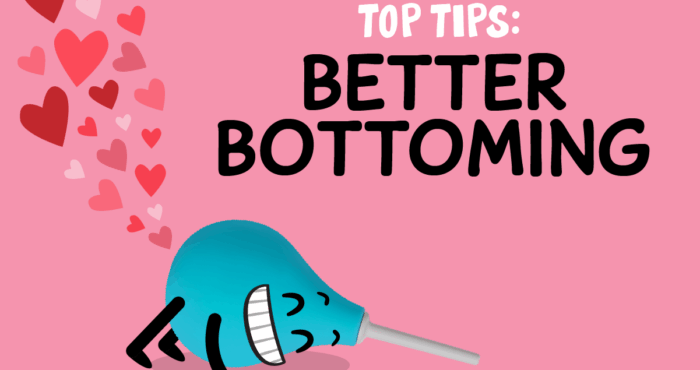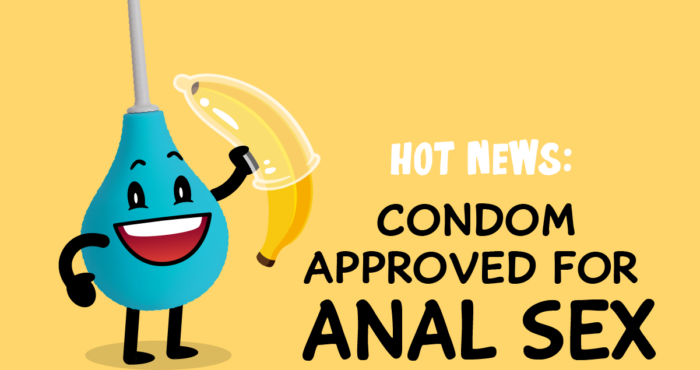Better conversations about our butts
When was the last time you had a conversation about your butt? If you wanted to start a conversation about your butt, who would you talk to, and what would you say?
I once asked my gay, male doctor what I could do to maintain good butt health. He told me as a 30-something HIV-negative person with no symptoms or concerns there weren’t any services available from my health care system or any specific advice he could give.
Thinking back on this encounter, there could have been many topics he could have addressed—such as prostate health, anal cancer and its causes, how to keep my digestive system on point, how to prevent or get rid of pesky hemorrhoids, and best practices for being ready when the time comes for a hot session.
For many people—queer folks, gay men, women, trans individuals—butts are an important part of our sex lives. But many people don’t get the information, education and resources they want and need to not only care for their butts and keep them healthy, but also to have the hottest sex possible. People are hungry for information and quality conversations about hot anal sex and butt health. That goes for queer AND straight people. (Straight guys might not be getting fucked in the ass, but they might want—and need—to know about all things anal for their partners.)
We recently did a survey of our online audiences to ask them about topics related to anal health and sex. More than 400 people responded (mostly people who identified as male, but also cis women, trans men and women, non-binary people, gender non-conforming people, and genderqueer people) with most people (96%) reporting that they had or currently have anal sex.
Nearly a quarter of people (23%) reported that they have wanted or needed to talk to a health care provider about a problem or issue related to their butt, but didn’t.
It’s up to us to start—and keep having—conversations about our butts.
Speak up for sexual health
Some respondents gave examples of times when they were able to talk to their health care providers about anal health.
“I’m fortunate [to] have doctors I can talk to about what’s going on with my butt,” wrote one respondent. “Even explaining blood in my stool sample is from a recent heavy play session, and not something more serious.”
Another wrote, “I’ve had hemorrhoids and anal warts and even am participating in an anal cancer study. I’ve also had a colonoscopy, countless STI anal swabs and a prostate exam. I have no problem discussing my butt with a health provider.”
Yet more than a handful (over 30 people) reported “embarrassment” as the top reason why they didn’t seek health care for an issue or problem related to their butt. One person cited “the stigma of gay sex in general, but in particular being the receptive partner in anal sex” as the reason why they didn’t seek care for an anal health concern. Another said they feared “being told I shouldn’t engage in activities I enjoy.”
Being able to speak up for your sexual and anal health needs is incredibly important, even though—I get it—talking about some of these topics can be awkward and embarrassing. But keep your head up—your health care providers are there to serve you and (should) have your best interests at heart.
“I tell myself that talking about my butt is their job,” wrote one survey participant. “They see a lot of butts every day. It helps reduce my embarrassment.”
Find health care providers who get you
At Magnet, we see butts all day, every day. Our practitioners might have a good idea of what’s going on down there if you have an issue, and will likely be able to give you advice on how to take care of it. But, first you have to ask! You may have to educate yourself and your doctor. You have to find the right resources and services, and hopefully when you find them, your insurance will cover them.
Many people in the survey said they experienced shame related to anal sex, feared judgment or disapproval, or were distrustful of medical professionals who may be unfamiliar with queer/LGBTQ health concerns.
“Honestly, it’s hard to talk to some doctors unfamiliar with gay men’s health issues,” wrote one respondent.
Many people said they actively sought out health care professionals who were well-versed about queer health concerns. “I make sure I have a doctor who’s comfortable with, and knowledgeable, about gay sex,” said one person.
Another person shared, “I was too ashamed to ask my gastroenterologist about hemorrhoids and rectal bleeding. I was worried that these problems were related to my using anal sex toys. I finally got up the courage to ask my psychiatrist. My psychiatrist told me that if I don’t feel comfortable asking my gastroenterologist, I need to get a new one. So I finally did get a new gastroenterologist.”
Do what you can to find a provider that treats you with respect—this is incredibly important. I see every day how our sexual health services staff at San Francisco AIDS Foundation work to validate the lives of the people we serve. We meet people where they are—without judgement—understanding that we all have different bodies with different needs.
No matter who you are and how much you know, it’s hard to talk about butts and it’s even harder to find answers to the questions you might be too embarrassed to ask. But we at least have to start the conversation.









